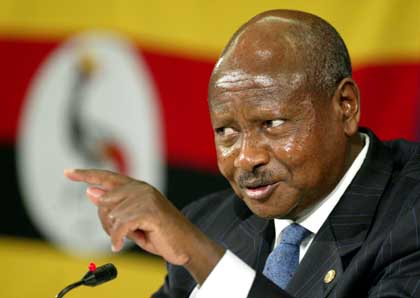What some East Africans and Ugandans have been considering a joke is slowly taking shape; that, one day by the grace of President Yoweri Kaguta Museveni, his only begotten son, Muhoozi Kainerubaga, 38, could become the president of Uganda. The young man is on a rapid rise in military ranks having been promoted to Brigadier General this week.
Although Kainerubaga insists that he deserves these expedited promotions, some observers think there is more explanation to what is happening, echoing long-harboured sentiments that Museveni is waiting for his son to be ready to smoothly inherit power. He already has already a record number of family members in key government positions.
Yes, it has taken only 13 years for the younger Museveni to move up from a cadet officer to a brigadier since officially joining the Ugandan People’s Defence Forces (UPDF) in 1999. Apart from a son Muhoozi, Museveni, 68, and his wife Janet, 64, are blessed with three daughters, Natasha, Patience and Diana aged 36, 34 and 32 respectively.
On Monday when a statement from Uganda’s State House read: “The President and Commander in Chief has decided to re-organise the Special Forces Group into Special Forces Command which will be under the overall command of Brigadier (General) Muhoozi Kainerugaba who has been promoted from the rank of Colonel”. That was it!
Apparently, this was not the first time for Kainerubaga to receive a surprise promotion. Back in 2001 visiting Libyan leader, Colonel Muammar Gaddafi, promoted Kainerugaba from a second lieutenant to a major jumping two ranks – lieutenant and captain. Following a training stint he became a lieutenant colonel sometime after June 2008 and a full colonel in September 2011.
In military ranks, especially in the army, after cadet officer one becomes a second lieutenant, then a lieutenant in about a year, then based on attendance of commanding courses an officer moves from lieutenant to captain, major, and finally lieutenant colonel.
Thereafter, performance, experience, luck, perhaps specialised training or a graduate degree in areas of national security or strategic studies take someone up from colonel to brigadier general, major general, then lieutenant general and finally a full general. Assuming nepotism or corruption doesn’t help someone, this is not an easy journey.
The young general was born in Dar es Salaam, Tanzania on April 24, 1974, about a year after his exiled parents had married in 1973. He grew up in Tanzania until 1979 when the family moved back to Uganda. However, in February 1981, the family had to relocate briefly to Kenya when Museveni launched a guerilla war from the north. The family then moved to Gothenburg, Sweden in 1983 and lived there until May 1986 when they returned to Uganda after Museveni and his National Resistance Army had taken power in Kampala four months earlier in January.
Based on the accounts of some Ugandans, in 1994 Kainerugaba was out of high school and busy dreaming about running family businesses, but somehow things changed and he started persuading his friends at Makerere University to follow him in the military. He hung around his father’s army before going to the United Kingdom to study political science at Nottingham University, returning to Uganda in 1999. He went straight into the UPDF, got married, and was immediately sent back to the UK to the Royal Military College at Sandhurst where he graduated in 2000.
After Gaddafi made him a major in 2001, Kainerugaba was sent to the Egyptian Military Academy for a double training in company and battalion commanding courses. In 2007 he went to the United States to complete a one-year course at the Army Command and General Staff College at Fort Leavenworth, in Kansas, an elite school that trained Rwanda’s Paul Kagame in 1990. Additionally, Kainerugaba has attended a number of staff courses including the recently completed six-month advance course in national security at the South African National Defence College.
Unlike other Ugandans who face the fate of fighting in various frontlines, the lucky and well-privileged First Son hasn’t come across many dangerous operations like fighting in Somalia, as his post has always been in-charge of protecting his father - the President.
He first started with the Presidential Protection Unit, then the Special Forces Group, which technically contains the unit, and now named Special Forces Command.
In July, a Ugandan newspaper, The Observer, reported an interview that Kampala’s Capital FM’ radio had with Kainerugaba on the issue.He brushed off the rumours that he was being groomed to become the president of Uganda as “rubbish”, but he was smart enough to admit that he could not rule out the possibility.
Being a man of an impeccable character, educated, well-trained, disciplined, and well positioned, could he one day assume more responsibilities as the president of Uganda?
What does this say about the emerging trend in African politics of father-son presidencies? |


No comments:
Post a Comment